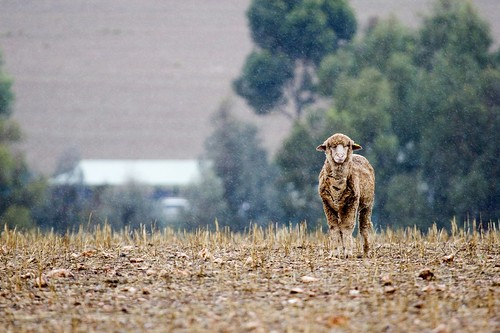Bumper wheat crop under threat
Posted by Big Gav in agriculture, australia, drought, food prices, global warming
The SMH reports that La Nina is weakening and drought is grabbing hold of eastern Australia again, which will likely put further pressure on international grain prices - Bumper wheat crop under threat.
A POTENTIALLY vast wheat crop that could help relieve the world's food crisis is in jeopardy due to a brutally dry autumn across the NSW grain belt. Record wheat prices have farmers primed to sow a crop that could help them bounce back financially after years of poor or failed harvests caused by drought, but rain is badly needed.
The latest drought figures released by the State Government show 48.4 per cent of the state is in drought, up from 42.9 per cent last month. Another 23.6 per cent is marginal and 28 per cent satisfactory.
Parts of the Bourke, Braidwood, Central Tablelands, Forbes, Goulburn, Molong and northern New England districts moved back into drought in the past month. All of the Coonamble, Coonabarabran, Tamworth and Narrabri districts went from satisfactory to marginal. Almost all the NSW grain belt is now either in drought or marginal, despite the fact many areas received good La Nina summer rain.
Burren Junction in the north usually gets 40 millimetres in April but only scored 5 millimetres this year, while in the south Corowa usually has 44 millimetres and received 10.
The Bureau of Meteorology's latest rainfall outlooks says: "The La Nina event in the Pacific Basin is weakening: computer models indicate a return to neutral conditions over the outlook period of May-July." At the southern end of the NSW grain belt there is only a 50 per cent chance of rainfall being above-average.
In its latest grains report, the NSW Department of Primary Industries is forecasting an autumn-winter wheat sowing of 3.4 million hectares, but "good soaking rains will be required to achieve forecast plantings".
In 2007 an estimated 3.04 million hectares was planted but only 1.63 million hectares harvested as a result of widespread drought. The 2007-08 harvest was the state's smallest in more than a decade.
The Primary Industries Minister, Ian Macdonald, said of the drought data: "These figures represent a real fear in the country that our winter crop may yet again be savaged by this merciless drought as the crucial autumn break has not arrived and time is running out."
Many farmers have suffered more than seven years of consecutive drought, failed crops and dwindling water supplies.
The department estimates 5 to 15 per cent of the forecast winter crop has so far been sown into dry soil in the hope rain will come.
TomDispatch has an article from Bill McKibben on "The Defining Moment for Climate Change".
Already climate change -- in the form of a changing pattern of global rainfall -- seems to be affecting the planet in significant ways. Take the massive, almost decade-long drought in Australia's wheat-growing heartland, which has been a significant factor in sending flour prices, and so bread prices, soaring globally, leading to desperation and food riots across the planet.
A report from the Bureau of Meteorology in Australia makes clear that, despite recent heavy rains in the eastern Australian breadbasket, years of above normal rainfall would be needed "to remove the very long-term [water] deficits" in the region. The report then adds this ominous note: "The combination of record heat and widespread drought during the past five to 10 years over large parts of southern and eastern Australia is without historical precedent and is, at least partly, a result of climate change."
Think a bit about that phrase -- "without historical precedent." Except when it comes to technological invention, it hasn't been much part of our lives these last many centuries. Without historical precedent. Brace yourselves, it's about to become a commonplace in our vocabulary. The southeastern United States, for instance, was, for the last couple of years, locked in a drought -- which is finally easing -- "without historical precedent." In other words, there was nothing (repeat, nothing) in the historical record that provided a guide to what might happen next.
Now, it's true that the industrial revolution, which led to the release of greenhouse gases into the atmosphere at historically unprecedented rates, was also, in a sense, "without historical precedent"; but most natural events -- unlike, say, the present staggering ice melt in the Arctic -- have been precedented (if I can manufacture such a word). They have been part of the historical record. That era -- the era of history -- is now, however, threatening to give way to a period capable of outrunning history itself, of outrunning us.
The planet in its long existence may have experienced the extremes to come, but we haven't. The planet, unlike much life on it, may not -- given millions or tens of millions of years to recover -- be in danger, but we are.
When you really think about it, history is humanity. It's common enough to talk about some historical figure or failed experiment being swept into the "dustbin of history," but what if all history and that dustbin, too, go… well, where? What are we, really, without our records? Once we pass beyond them, beyond all the experience we've collected, written down, and archived since those first scratches went on clay tablets in the lands of the Tigris and Euphrates -- now being stripped of their cultural patrimony -- at least two unanswerable questions arise. Once history has been left in the dust, where are we? -- and, who are we?






